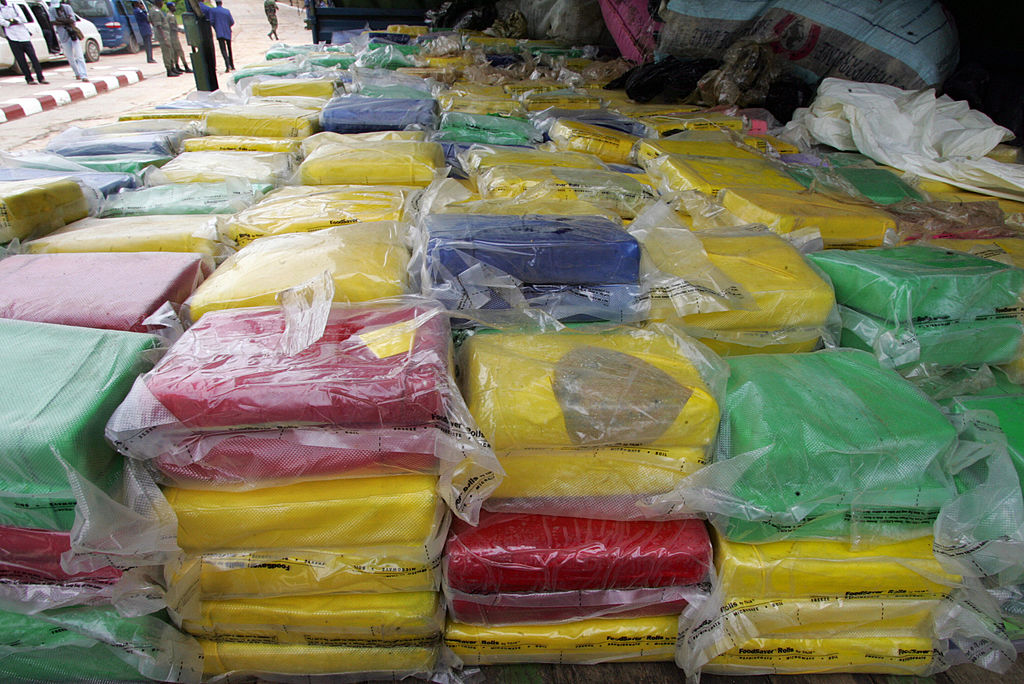Gambian Authorities Take Steps to Combat Maritime Cocaine Trafficking
ADF STAFF
Senegalese authorities in February seized 805 kilograms of cocaine in waters about 530 kilometers off the coast of Dakar from a Gambian fishing boat. The seizure resulted in seven arrests.
The Gambian vessel was intercepted by Senegalese officers through collaboration with the Atlantic Analysis and Operations Center, the French Air Force and the United States Drug Enforcement Agency.
According to Gambian newspaper The Point, the arrests and seizure were made after a seven-month investigation into an Albanian drug trafficking organization based in Spain that has access to a large maritime infrastructure in Brazil. From there, vessels loaded with cocaine sail to the organization’s base in the Gulf of Guinea.
The Gambian boat received the cocaine from a larger ship in open waters, The Point reported. Much of the cocaine trafficked from South America through Africa is headed for Europe.
Experts say cocaine production in Latin America has reached unprecedented levels. The amount of drugs trafficked through the region is difficult to gauge, but some experts value the cocaine business in West Africa at $2 billion annually.
A police officer with The Gambia’s Drug Law Enforcement Agency (DLEAG) told ENACT, an organized crime index, that the rise in the country’s maritime cocaine trafficking began in the early 2000s.
In January 2021, Gambian authorities made the largest cocaine seizure in the nation’s history when they confiscated nearly 3 tons with a street value of $87 million at the port in Banjul. They found the drugs in 118 bags in a container that was supposed to be carrying salt from Ecuador.
“This seizure is yet another confirmation that Gambia, like other West African countries, continues to be a storage and transport route for cocaine by international organized crime groups,” Ousman Saidybah, a DLEAG spokesman, said in a report by The Maritime Executive.
The illicit trade flourished in The Gambia under former leaders, according to Michael Davies, executive director of Public-Private Integrity, an anti-corruption civil society organization.
“Under the (former President) Yahya Jemmeh era, the government faced substantial challenges in investigating and prosecuting drug crimes, primarily stemming from inadequate case management, a shortage of staff in the judicial sector and court overload, and the criminals knew that,” Davies told ENACT.
Seizures such as the ones in Senegal and Banjul highlight the efforts local authorities have made in recent years to address the smuggling of cocaine and other drugs around the region.
The Gambia has taken steps to better investigate and prosecute drug crimes and increased cooperation with regional and international partners to share intelligence, run joint operations, train law enforcement and improve capacity to detect and intercept drug trafficking boats, ENACT reported.
The Gambia also has increased investment in law enforcement agencies, resulting in more drug seizures. From January 2021 to April 2023, the DLEAG recorded 1,629 drug trafficking cases involving 1,665 suspects, according to Gambian television station QTV.
The country in 2021 signed an agreement with Nigeria to fight maritime crimes, including drug trafficking.
In January, The Gambia signed an agreement with the Seaport Cooperation Project (SEACOP), a European Union-funded project that works with countries to disrupt and prevent maritime trafficking.
Akizi-Egnim Akala, SEACOP’s deputy regional coordinator for West Africa, told ENACT that the agreement would build on the “good work” current Gambian President Adama Barrow’s “administration is doing to take the fight to the criminals.”
Akala said the project will provide The Gambia’s drug enforcement agencies with advanced container scanning equipment and data analysis tools to improve its ability to identify and intercept illegal goods.
Writing for ENACT, Feyi Ogunade argued that The Gambia should also establish a maritime task force comprised of police officers, Navy personnel and customs agents that is dedicated to fighting drug trafficking.
After a cocaine bust in early August resulted in the arrests of two Bissau Guineans, Saidybah, the DLEAG spokesman, said the agency is working around the clock to combat drug trafficking — whether by land or sea.
“I can assure you that we will leave no stone unturned in our quest in making The Gambia a drug free nation,” he told The Point. “That’s the objective of the high command and the government; hence we are working in that direction. Equally, public participation in this drive is crucial. We can’t be everywhere, thus it is important that the public help us with information and support in arresting the issues of drugs in the country.”


Comments are closed.